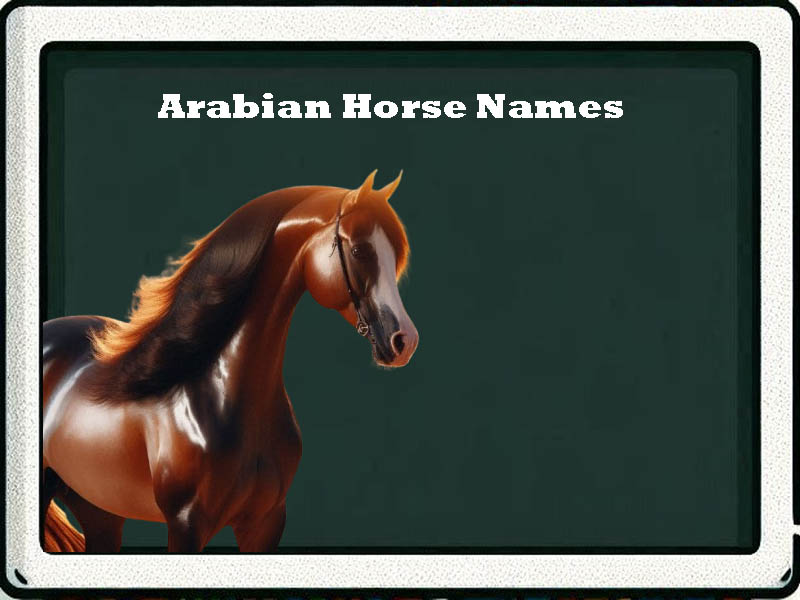Arabian Horse Names: Ideas from Horse Forum
The world of Arabian horse names is a captivating reflection of the elegance and cultural significance of the Arabian horse.
Known for their refined breed and historical connection to the desert, these majestic animals are celebrated not only for their endurance and grace but also for the thought and care that go into their names.
Drawing inspiration from Arabic traditions, naming an Arabian often reflects the horse’s characteristics, lineage, or role—whether it’s a noble stallion, a graceful mare, or a spirited companion for a memorable ride.
Horse names, particularly those of the Arabian lineage, carry a sense of heritage and pride.
Each name embodies the beauty, power, and storied past of this iconic breed, making the act of naming a symbolic gesture that connects the horse to its history and future.
Whether galloping in competition or resting in stables, the right name ensures that every horse stands out and leaves a lasting impression.
Here is a list of 30 Arabian horse names, including their meanings, inspired by popular Arabic culture and traditions:
Male Arabian Horse Names
- Amir – Prince, symbolizing leadership and royalty.
- Farid – Unique, emphasizing individuality.
- Adel – Just, reflecting fairness and integrity.
- Kamil – Perfect, representing completeness.
- Saud – Fortunate, indicating good luck.
- Azzam – Determined, showcasing resolve and strength.
- Emir – Commander, a sign of authority and leadership.
- Faris – Horseman or knight, linked to bravery and equestrian skills.
- Nabil – Noble, representing dignity.
- Tariq – Morning star, symbolizing brightness and hope.
Female (Girl) Arabian Horse Names
- Layla – Night, evoking beauty and mystery.
- Zahra – Flower or white, symbolizing purity and elegance.
- Amirah – Princess, representing grace and leadership.
- Noor – Light, signifying illumination and clarity.
- Samira – Entertaining companion, indicating charm and sociability.
- Jamilah – Beautiful or graceful, reflecting elegance.
- Yasmine – Jasmine flower, a symbol of delicate beauty.
- Huda – Right guidance, reflecting wisdom.
- Dalal – Coquetry, playful charm.
- Farida – Unique, emphasizing rarity and distinction.
Unisex Names
- Malak – Angel, representing divinity and purity.
- Dahab – Gold, indicating value and brilliance.
- Zafir – Victorious, symbolizing success.
- Qamar – Moon, representing serenity and beauty.
- Nasir – Helper, showcasing kindness and assistance.
- Wafiyah – Loyal, representing faithfulness.
- Badriya – Full moon, indicating completeness.
- Ghazala – Deer, symbolizing grace and swiftness.
- Altair – Flying eagle, linked to freedom and strength.
- Bassam – Smiling, reflecting happiness and friendliness.
Arabian Horse Names: A Blend of Arabic Tradition, Beauty, and Linguistic Richness
Arabian horse names hold a special place in equestrian culture, reflecting the profound connection between the Arabian horse and its long-standing heritage.
Known for their unmatched beauty and grace, these horses are often given names that symbolize their majesty and lineage.
Arabian horse names often draw inspiration from Latin roots to convey strength and elegance, much like “Kasztanka,” a historical horse name that represents a legacy of significance and tradition in naming practices.
Naming an Arabian horse is more than a formality; it is a celebration of its breed’s storied history and an homage to the cultures that have cherished these animals for centuries.
In Arabic tradition, naming practices often incorporate elements of the horse’s lineage, gender, or distinguishing traits.
Names can reference the horse’s mare, stallion, or foal lineage using patronymic naming conventions, linking the horse to its ancestry.
A common technique in naming is the use of genitive constructions—phrases where the ownership or relation is emphasized, such as “Son of the Desert” or “Daughter of the Wind.” These names evoke the deep cultural and spiritual connection Arabs have with their horses, often invoking God or divine qualities in the names to bless the animal.
Sibawayh, a prominent Arabic grammarian, highlighted the importance of grammatical gender and linguistic precision, which play a role in crafting these poetic names.
For example, names for male horses often carry robust and commanding meanings, while names for mares emphasize elegance and grace. The incorporation of adjectives enhances the descriptive nature of these names, adding layers of meaning.
The practice of naming Arabian horses has spread beyond the Arabian Peninsula, finding influence in countries like the United States and Spain, where horse breeding and horse shows celebrate the legacy of this noble breed.
In these regions, the English language and even Latin influences have blended with traditional Arabic naming conventions, creating a unique fusion of cultures.
One fascinating example of naming conventions is “Kasztanka,” a famous horse from Spain whose name reflects regional linguistic traditions while honoring the Arabian horse lineage.
The adaptability of these naming practices showcases how the language of naming evolves while still respecting the cultural origins.
Names like “Zahra” (meaning “flower” in Arabic) or “Shams” (meaning “sun”) resonate globally due to their universal appeal and connection to the natural world.
The versatility of Arabian horse names ensures they remain relevant, whether in traditional Arabic or modern translations, and their inherent beauty captures the spirit of the horse they represent.
The beauty of Arabian horses is undeniable, but if your horse has a golden coat, exploring Buckskin Horse Names might lead you to something just as fitting.
In this intricate tapestry of naming, the interplay of grammatical gender, adjective use, and cultural influences ensures that each name reflects not only the Arabian horse’s elegance but also its profound place in human history and imagination.
Whether galloping in a horse show or resting in a stable, these horses wear their names like crowns, embodying a legacy that spans centuries and continents.




-0 Comment-